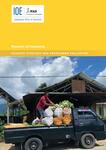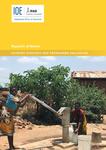Page Header

Downloads:
2
Federal Republic of Nepal Country Strategy and Programme Evaluation
Overview
This is the third country strategy and programme evaluation carried out in Nepal by the Independent Office of Evaluation of IFAD (IOE). The report reviews the joint work of IFAD and the Government of Nepal over the past seven years (2013 -2019), covering eight projects. Over the past decades, farm fragmentation and low crop productivity have endangered the economic viability of traditional farming systems in the country. According to the report’s findings, IFAD has helped increase the productivity of small farms by focusing on improved production of high-value crops, such as spices, off-season vegetables, fruits, cereal and dairy products. Linking small-scale farmers with value chains was important to enhance their economic opportunities. The programme has helped improve farmers’ access to markets, including international markets, as well as the transparency, stability and predictability of prices. However, the report highlights some areas for improvement. The evaluation recommends supporting federalization in the country, focusing on how to adapt the projects to the new system and as well as on how to support local governments in promoting rural development. According to the report, IFAD should bring back into its funding spectrum the support to community development, basic infrastructure and services as a preparatory step for further economic opportunities. Finally, the evaluation recommends strengthening partnerships for specialized technical support and for cofinancing.Report Details
| Year Published | |
| Type | |
| Joint | No |
| Partner/s | N/A |
| Consultant name | |
| Agency Focal Point | Fabrizio Felloni |
| Focal Point Email | evaluation@ifad.org |
| Managed by Independent Evaluation Office | Yes |
| Country/ies |
YOU 'RE READING
Federal Republic of Nepal Country Strategy and Programme Evaluation








